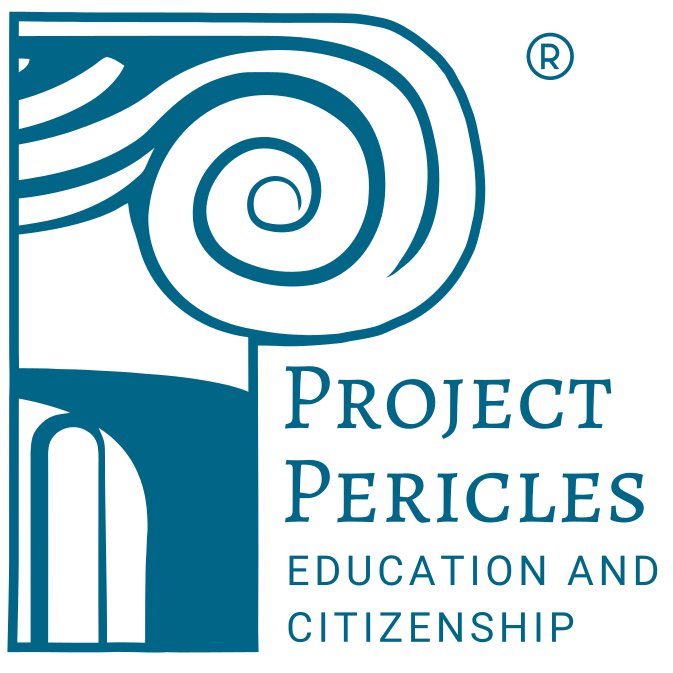|
Below is information about Project Pericles' policies and other commonly asked questions. If you would like to learn more, please contact us with any questions or inquiries.
I know a college that would be a good candidate to join Project Pericles. How should it proceed?
Many factors play a role in the consideration of new Pericleans, including: institutional mission; administration and governance; memberships and relationships; institutional type and character; resources; location; existing activities; and special contacts and unusual opportunities. Institutions that are interested in discussing how an institution can be a part of Project Pericles should feel free to contact us. We are always eager to learn about institutions that are promoting responsible citizenship, whether or not this is done as a Periclean Program. What are the benefits of joining Project Pericles?
Project Pericles reflects a proactive commitment to higher education’s original mission in America: to prepare young people for responsible civic leadership. It gives each Periclean and its constituents the opportunity to protect and enhance its equity in the future of our democratic society. Benefits come from the synergies of like-minded institutions that share ideas, promote joint undertakings, and explore new and different opportunities for support, programs, and affiliations. The national office of Project Pericles works with Periclean colleges and universities to develop civic engagement programs that support, enhance, and extend their existing activities. These programs are designed to deepen the Periclean mission on campus by enabling and by empowering students to become more thoughtful and effective advocates. Signature Periclean programs include the Debating for Democracy (D4D)™ and the Periclean Faculty Leadership (PFL) Program™. Each college becomes a full participant in our annual Program Directors’ Meeting, hosted by a different member institution each year. My institution is not currently a Periclean. Can we still be involved with Project Pericles?
Yes, absolutely. In addition to our Periclean consortium, we work with more than 40 other institutions across the nation through a variety of our other programs. Please contact us for more information. What is meant by terms such as “civic engagement,” “participatory citizenship,” and “responsible citizenship”? Are these ways of saying that you want to increase voter turnout?
Voting is one expression of civic involvement, but far from the only one. Periclean Programs strive to give students the intellectual and experiential foundations for all aspects of responsible citizenship. These include taking an interest in public affairs, engaging in civil discourse, understanding and actively participating in democratic political processes, being able to analyze news and information, cultivating and effectively advocating opinions on matters of public policy, understanding diverse opinions, supporting free speech, being involved in community service that addresses public problems, and, above all, having the confidence that through democratic processes, individuals can “make a difference.” How does community-based learning or service learning fit into what Pericleans do?
Community-based learning, or service learning, is an important element of most Periclean Programs, providing valuable knowledge, insight, and experience. To be meaningful, Project Pericles believes that community-based learning at Periclean institutions needs to go beyond exercises in volunteerism—it should address defined needs and learning objectives. Community-based learning must involve preparation, oversight, and accountability, as well as the opportunity for reflection. When conducted in this manner, these projects will create lasting educational experiences that are significant to the participating students and the community. Does Project Pericles advocate a particular political viewpoint?
No. Project Pericles is interested in promoting the interest, understanding, and active participation of students in the institutions and processes of our democracy in order to improve the condition of society, without regard to a particular viewpoint or agenda. We believe that students should be informed about issues and reach their own thoughtful conclusions—whatever they may be—and be prepared to discuss and advocate as responsible citizens. How was the name “Project Pericles” selected?
Project Pericles was named after the Athenian statesman, Pericles. In the fifth century BCE, Pericles led the city-state of Athens to become history’s prototypic democracy. Recognizing that every citizen has both a duty to serve and the potential to lead, Pericles and his fellow Athenians laid the foundation for modern democracy – a legacy to men and women seeking to govern themselves in a free society. This legacy is the core concept of America’s founding philosophy. It epitomizes the meaning and defines the purpose of Project Pericles – to promote and facilitate preparation for participatory citizenship as an essential part of the educational programs of colleges and universities. Project Pericles pays tribute to Pericles by working with institutions of higher education to extend the meaning, purpose, and inspiration of his legacy. |
551 Fifth Avenue, Suite 1910, New York, NY 10176-0899
[email protected]
Privacy Policy | Terms & Conditions
[email protected]
Privacy Policy | Terms & Conditions
Support Project Pericles
All rights reserved ©
Project Pericles

